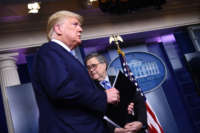
The Department of Justice (DOJ) on Monday night appealed a decision from a district judge, made earlier this month, that would have required the department to release full details of a memo that former Attorney General William Barr had said helped him decide not to prosecute former President Donald Trump.
The DOJ agreed to release the first page and half of the second page of that memo, but argued that attorney-client privilege would be violated if the remainder of the document was made public. The memo says that although special counsel Robert Mueller did not come to a conclusion on whether obstruction of justice charges should be brought against Trump in his report about Russian interference in the 2016 presidential election, the Justice Department would not be making any such charges.
Barr and other officials in the department had suggested the memo, which was crafted shortly after Mueller submitted his report in 2019, contained details of their deliberative process for choosing not to prosecute Trump. Following that DOJ assertion, Citizens for Responsibility and Ethics in Washington (CREW) filed an open records request demanding to see the memo.
Earlier this May, D.C. Circuit Court Judge Amy Berman Jackson ruled that the Justice Department, now under Attorney General Merrick Garland’s watch, was disingenuous in its arguments against sharing the memo, as it had appeared to her that the document was not so much about making a decision to charge Trump or not but rather a justification for a decision that had already been made not to charge the former president.
“The review of the document reveals that the Attorney General [Barr] was not then engaged in making a decision about whether the President should be charged with obstruction of justice; the fact that he would not be prosecuted was a given,” Jackson wrote in her opinion.
Indeed, Barr was already briefing Congress on his decision not to charge Trump when the memo was being finalized by the department.
The claims that the memo was a deliberative document over whether or not to charge Trump were therefore “so inconsistent with evidence in the record, they are not worthy of credence,” Jackson said in her opinion.
The DOJ, in appealing Jackson’s decision, seemed to acknowledge that they used “language that was imprecise” when it came to their previous claims. But they also said that the mistake did not justify making the department’s “deliberative process” public.
Freedom of Information Act requests can be denied by the government under some circumstances, the DOJ argued, including shielding government agencies from having to disclose how they make prosecutorial decisions. Those rules are “intended to protect the confidentiality of the government’s deliberative process,” they added.
Jackson is giving CREW until Friday to issue a legal response to the appeal. CREW President Noah Bookbinder blasted the department’s refusal to release the document in full.
“The Department of Justice had an opportunity to come clean, turn over the memo, and close the book on the politicization and dishonesty of the past four years,” Bookbinder said in a statement. “Last night it chose not to do so.”
The DOJ’s appeal is “a position that is legally and factually wrong and that undercuts efforts to move past the abuses of the last administration,” Bookbinder added. “We will be fighting this in court.”
Prior to the Mueller report being released, Barr had said that in his opinion, there wasn’t anything within the report that warranted prosecuting Trump. The former president used that announcement by his attorney general to suggest that he had been exonerated. However, after the report was made public, it was demonstrated that there were at least 10 actions taken by Trump that could have amounted to obstruction of justice.
Mueller left it up to the DOJ and to Congress to act on that information if they chose to via possible impeachment proceedings. But in that eponymous report, Mueller also made it a point to note that Trump had not been exonerated by his findings.
“If we had confidence after a thorough investigation of the facts that the President clearly did not commit obstruction of justice, we would so state,” the report said. “Based on the facts and the applicable legal standards, we are unable to reach that judgment. Accordingly, while this report does not conclude that the President committed a crime, it also does not exonerate him.”
This post was originally published on Latest – Truthout.